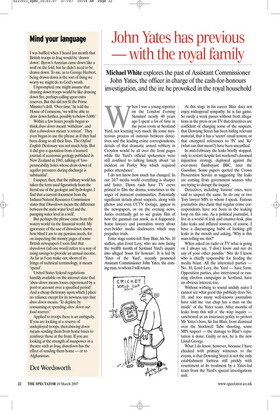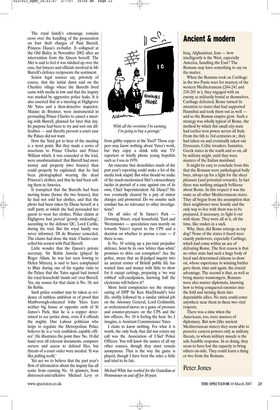John Yates has previous — with the royal family
Michael White explores the past of Assistant Commissioner John Yates, the officer in charge of the cash-for-honours investigation, and the ire he provoked in the royal household When I was a young reporter on the London Evening Standard nearly 40 years ago I spent a lot of time in the press room at Scotland Yard, not learning very much. By some mysterious process of osmosis between detectives and the leading crime correspondents, details of that dramatic armed robbery in Croydon would be all over the front pages while the Yard’s official spokesmen were still confined to talking lamely about ‘an incident on Purley Way which required police attendance’.
I do not know how much has changed. In our 24/7 media world everything is sharper and faster. Dawn raids have TV crews primed to film the drama, sometimes to the anger of innocent communities. Potentially significant details about suspects, along with photos and even CCTV footage, appear in the newspapers, or on the evening news. Juries eventually get to see grainy film of how the gunman ran amok, as it happened. Some lawyers and journalists worry about ever-bolder media disclosures which may prejudice trials.
Enter stage centre-left Tony Blair, his No. 10 staffers, plus Lord Levy, who are now facing the twelfth month of Scotland Yard’s inquiry into alleged ‘loans for honours’. It is led by ‘Yates of the Yard’, recently promoted Assistant Commissioner John Yates, the coming man, to whom I will return. At this stage in his career Blair does not enjoy widespread sympathy: he is fair game. So rarely a week passes without fresh allegations in the press or on TV that detectives are confident of charging some of the suspects, that Downing Street has been hiding relevant material, that it has a ‘secret’ email system, or that encrypted references to ‘Ps’ and ‘Ks’ (what can that mean?) have been unearthed.
In mid-February the leaks briefly stopped, only to restart despite last weekend’s doomed injunction strategy, deployed against the ever-more flamboyant BBC, later the Guardian. Some papers quoted the Crown Prosecution Service as suggesting ‘the leaks are coming from government sources who are trying to disrupt the inquiry’.
Detectives, including ‘furious’ ones, were said to suspect the same. So do one or two Tory lawyer MPs to whom I speak. Furious journalists also claim that regular crime correspondents have not been in the leaking loop on this one. As a political journalist, I live in a world of leak and counter-leak, plus fake leaks and inflated sources, of course. I have a discouraging habit of looking gift leaks in the mouth and asking, ‘Why is this man telling me this?’ When asked on radio or TV what is going on I always say, ‘I don’t know and nor do any of your other pundits.’ Nor do I know who is chiefly responsible for feeding the media beast. All the interested parties No. 10, Lord Levy, the Yard — have form. Opposition parties, also interviewed or running election campaigns in Scotland, have an obvious interest, too.
Without wishing to sound unduly naive I cannot see what good this publicity does No. 10, and too many well-known journalists have told me ‘our chap has a man on the inside’ of the Yates team. After months of leaks from this will o’ the wisp inquiry sanctioned as an insurance policy to protect Mr Yates’s boss, Sir Ian Blair, from dismissal over the Stockwell Tube shooting, some MPs suspect — the damage to Blair’s reputation is done. Guilty or not, he is the new Lloyd George.
What I do know, however, because I have checked with primary witnesses to the events, is that Downing Street is not the only establishment fortress still prickly with resentment at its treatment by a Yates-led team from the Yard’s special investigations unit. The royal family’s entourage remains cross over the handling of the prosecution on four theft charges of Paul Burrell, Princess Diana’s ex-butler. It collapsed at the Old Bailey in November 2002 after an intervention from the Queen herself. The Met is said to feel it was stitched up over the case, but lawyers and officials involved in Mr Burrell’s defence reciprocate the sentiment.
Senior legal sources say, privately of course, that the initial dawn raid on the Cheshire village where the Burrells lived came with media in tow and that the inquiry was marked by aggressive police leaks. It is also asserted that at a meeting at Highgrove Mr Yates and a then-detective inspector, Maxine de Brunner, were instrumental in persuading Prince Charles to cancel a meeting with Burrell, planned for later that day. Its purpose had been to try and sort out difficulties — and thereby prevent a court case the Palace did not want.
How the Yard got to hear of the meeting is a moot point. But they made a series of assertions to Prince Charles and Prince William which, it was conceded at the trial, were unsubstantiated: that Burrell had more money and property (two houses) than could properly be explained; that he had been photographed wearing the dead Princess’s clothes; and that he had been selling them in America.
It transpired that the Burrells had been moving home (hence the two houses), that he had not sold her clothes, and that the photo had been taken by Diana herself at a staff party at which she had persuaded her guests to wear her clothes. Police claims at Highgrove had proved ‘grossly misleading’, according to the defence QC, Lord Carlile, during the trial. But the royal family was never informed, DI de Brunner conceded. The claims had done the trick: Charles cancelled his session with Paul Burrell.
Little wonder that the Queen’s private secretary, Sir Robin Janvrin (played by Roger Allam, he was last seen bowing to Helen Mirren), is said to have complained to Blair during one of his regular visits to the Palace that the Yates squad had turned the royal household ‘inside out’ over Burrell. Yes, my source for that claim is No. 10, not Sir Robin.
Such police conduct may be taken as evidence of ruthless ambition or of proof that Marlborough-educated John Yates fears neither big house at opposite ends of St James’s Park; that he is a copper determined to see justice done, even if it offends the mighty. One Labour politician who helps to regulate the Metropolitan Police believes he is a ‘very confident, capable officer’. He illustrates the point thus: No. 10 did hand over all relevant documents, computer servers and access to deleted files, but threats of a court order were needed. ‘It was like pulling teeth.’ Yet are we to believe that the past year’s flow of information about the inquiry has all come from cunning No. 10 spinners, from distressed-and-talkative Michael Levy or from gabby coppers at the Yard? Those coppers may know nothing about Yates’s work, but they enjoy a drink with star TV reporters or kindly phone young hopefuls such as I was in 1970.
An outcome that demolishes much of the past year’s reporting could make a lot of the media look stupid. But what should we make of the much-modernised Met’s extraordinary tactics in pursuit of a case against one of its own, Chief Superintendent Ali Dizaei? He was eventually cleared by a jury of minor charges and promoted. Do we assume such conduct has no relevance to other investigations?
On all sides of St James’s Park Downing Street, royal household, Yard and Westminster — speculation runs merrily on towards Yates’s report to the CPS and a decision on whether to pursue a case — if there is one.
Is No. 10 setting up a pre-trial prejudice defence, hoist by its own ‘whiter than white’ promises to drive out corruption? Are the police, aware that an ill-judged inquiry into an ancient corner of British public life has wasted time and money with little to show for it except cuttings, preparing a ‘we wuz robbed’ self-exculpation, knowing half the electorate will believe it?
More lurid conspiracies see the strange outing of DPP Sir Ken MacDonald’s love life, swiftly followed by a similar tabloid job on the Attorney General, Lord Goldsmith, as orchestrated moves in a game of pressure and counter-pressure on the CPS and the law officers. No. 10 is feeling the heat. So, I imagine, is Assistant Commissioner Yates.
I claim to know nothing. For what it is worth, the only body that did not return my call was the Association of Chief Police Officers. You will know the names of all my other sources, though they must remain anonymous. That is the way the game is played, though I have bent the rules a little and tried to be fair.
Michael White has worked for the Guardian at Westminster on and off for 30 years.



























































































 Previous page
Previous page